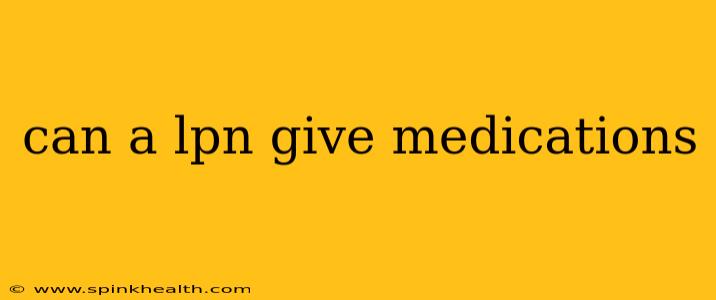Can an LPN Give Medications? The Complexities of Medication Administration
The question of whether an LPN (Licensed Practical Nurse) can give medications isn't a simple yes or no. It's a nuanced answer that depends on several crucial factors, making it a story with many chapters. Think of it like this: each state has its own unique healthcare regulations, a bit like a different recipe for nursing practice. The ingredients – the specific medications an LPN can administer – vary depending on the state's Nurse Practice Act, the LPN's training and experience, and the specific healthcare setting.
Let's delve into the individual chapters of this story.
What is the scope of practice for an LPN?
This is the first and most crucial chapter. The scope of practice outlines what an LPN is legally permitted to do. This isn't a universal standard; it differs significantly from state to state. Some states grant LPNs broader medication administration privileges than others. In some states, an LPN might administer oral medications, injections (under specific conditions), or even intravenous medications (IVs), under the supervision of a physician or registered nurse (RN). However, other states might have stricter limitations, confining LPNs to administering only oral medications or specific types of injections.
What are the differences between an LPN and an RN's medication administration?
RNs generally have a broader scope of practice when it comes to medications. Their advanced training allows them to administer a wider variety of medications, including IV medications, and often with greater autonomy. LPNs frequently work under the direct supervision of an RN or physician, which influences their medication administration responsibilities. The level of supervision required can also vary depending on the state and the specific medication being administered.
Does the setting influence medication administration rights?
Absolutely! The healthcare setting profoundly impacts an LPN's medication administration responsibilities. In a hospital, for instance, an LPN might work under close supervision and might have a more restricted scope of practice compared to an LPN working in a long-term care facility or a physician's office. The resources available, the patient population, and the overall staffing model all play significant roles.
What types of medications can an LPN typically administer?
The types of medications an LPN can administer are largely dictated by their state's Nurse Practice Act and their employer's policies. This can range widely, from simple oral medications like pills and liquids to subcutaneous injections or intramuscular injections (depending on state regulations and training). However, administering intravenous medications (IVs) or certain high-risk medications usually falls outside the typical LPN scope of practice.
What kind of training and certification do LPNs need to administer medications?
Beyond their basic LPN training, LPNs often receive additional training and certification to administer specific medications or injections. This training ensures they're competent and safe in their medication administration duties. They'll be required to demonstrate competence in calculating dosages, understanding potential side effects, and recognizing adverse reactions.
Are there specific medications an LPN can't administer?
Yes, absolutely. Certain medications are considered high-risk and generally reserved for RNs or physicians. These might include medications with narrow therapeutic indices (requiring precise dosing) or those that carry a significant risk of adverse events. The specific medications will depend on the state's regulations and the LPN's specific training and certification.
In conclusion, the question of whether an LPN can give medications lacks a simple answer. It is crucial to consult the specific state's Nurse Practice Act and the individual LPN's training and certifications for an accurate assessment. It's a multifaceted situation where many factors interact to determine the scope of medication administration an LPN can perform safely and legally. Always prioritize patient safety and adherence to the governing laws and regulations.

